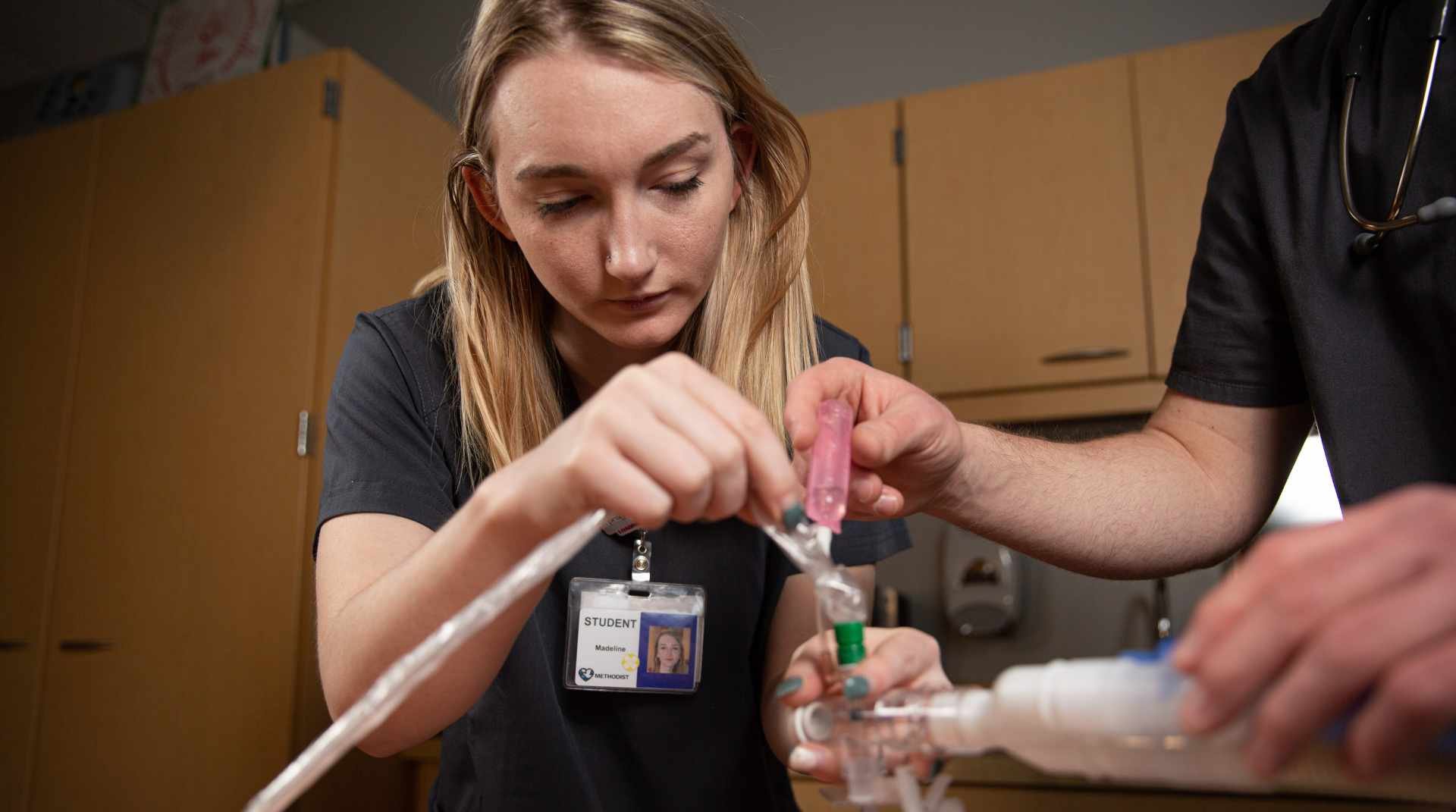.jpg?width=1920&height=1071&name=NMC%20launches%20respiratory%20therapy%20partnership%20with%20Hastings%20College%20(1).jpg) Working as a respiratory therapist (RT) allows you to help improve the quality of life of patients.
Working as a respiratory therapist (RT) allows you to help improve the quality of life of patients.
With variety to keep you engaged, hands-on patient care and many job opportunities, respiratory therapy is a career worth considering.
There’s a demand for respiratory therapists. Learn how to take on this exciting role.
What Does a Respiratory Therapist Do?
Respiratory therapists work with patients of any age, from premature babies to the elderly. The role involves finding, managing and preventing problems related to the cardiopulmonary system.
You might work with a patient with emphysema or someone who has trouble breathing without assistance because of an accident.
Your patients will rely on you to help diagnose conditions like asthma and sleep disorders. You’ll help them decide upon different therapies. You’ll implement and manage ongoing care and treatment programs.
Although hospitals are the primary place of employment, there are respiratory care opportunities in other areas, including:
- Wellness centers
- Medical offices
- Asthma clinics
- Sleep disorder centers
Skills and Qualities of a Successful Respiratory Therapist
Working as a respiratory therapist requires specific personality traits and skills.
- Compassion
- Critical thinking
- Empathy
- Good communication skills
- Technical proficiency
Read more: Six Personality Traits of a Good Respiratory Therapist

Education and Certification Requirements for Respiratory Therapists
The respiratory therapist education requirement is a bachelor’s or associate degree. You’ll also have to pass a respiratory therapist certification.
The path to becoming a respiratory therapist requires:
- A strong interest in health sciences.
- A professional but caring attitude, and a genuine empathy for others.
- A two-year Associate of Science in Respiratory Care from an accredited program. You’ll study human physiology and the cardiopulmonary system. Students also learn about critical thinking, communication skills, patient assessment, disease management protocols and care-plan development. Students learn through classroom teaching and hands-on practice in clinicals.
- After completing your respiratory care degree, you’ll take the Respiratory Therapist (CRT) exam. You’ll then take an advanced practitioner exam to earn your Registered Respiratory Therapist (RRT) credential.
If your goals include becoming a manager or educator, you can pursue a Bachelor of Science in Respiratory Therapy. Examples of these positions include:
- Respiratory care department manager
- Health education specialist
- Educator in respiratory care programs
- Health promotion manager
- Community agency employee, such as with the American Lung Association
At Nebraska Methodist College (NMC), students have three options for respiratory therapy degrees:
- Dual Degree - Associate of Science and Bachelor of Science in Respiratory Therapy
- Registered Respiratory Therapist (RRT) to Bachelor of Science in Respiratory Therapy
- Associate of Science in Respiratory Care
Read more: Which Respiratory Therapy Degree is Right For You?
Specializations in Respiratory Therapy
One of the most compelling aspects of a career in respiratory therapy is the remarkable variety of patient types and clinical settings RTs encounter daily. Once you’ve graduated and started your career, you’ll have an opportunity to continue your respiratory therapist training and earn a specialization.
Unlike many healthcare professionals who may focus on a specific unit or patient group, respiratory therapists are uniquely positioned to work across the entire hospital. Often all within the same shift, RTs might support patients in the following contexts and more:- The ICU
- Neonatal and pediatric units
- Acute care
- Adult critical care
- Oncology
- Bariatrics
- Sleep disorders
- Pulmonary rehabilitation

Career Benefits of Nebraska Methodist College’s Respiratory Therapy Program
NMC’s respiratory program sets high standards for students, both in the classroom and as a part of a wider healthcare community. With participation in community service activities students get a chance to work as part of a healthcare team. Students learn in an educational environment that harnesses high-tech nursing labs and a variety of cutting-edge techniques.
NMC graduates grow through their experiences working with patients during clinicals and attending training modules throughout the Omaha metropolitan area and rural sites. This wide breadth of knowledge further expands the career paths and options available to students.
Career Advancement Paths
Bachelor’s-prepared respiratory therapists can continue their education with specialization therapeutic areas such as sleep disorders, pulmonary function, critical care or neonatal pediatrics.
Becoming a respiratory therapy educator is also an option for career advancement.
Respiratory therapists with a bachelor’s degree can also advance their careers to management positions.
Growing Demand for Respiratory Therapists
As healthcare evolves to focus on prevention and wellness, the respiratory profession is growing quickly. Patient self-management and education are big focuses in healthcare today.
Growth in the middle age and elderly population will also mean a higher number of patients with respiratory problems. As these trends continue, there will be a higher demand for respiratory therapists throughout the country.
Salaries in respiratory care are also on the rise. According to the U.S. Bureau of Labor Statistics, the median salary in 2023 for a respiratory therapist was $77,960 per year.
Job Outlook and Career Advancement Opportunities
The respiratory therapist job outlook is 13% growth between 2023 and 2033, which is faster than the average for all occupations.
Read more: 8 Reasons Why Respiratory Therapy is Lifting Off
Take the Next Step to Get Your Respiratory Therapy Degree
Read more: How to Start a Career in Respiratory Therapy
Respiratory care is an important job in a growing field. Healthcare careers in respiratory therapy are worth considering if you’re looking for a high-demand, versatile career path.
Schedule a consultation with our academic advisors to learn more about NMC’s leading respiratory therapy program. Contact admissions@methodistcollege.edu or 402-354-7200.

